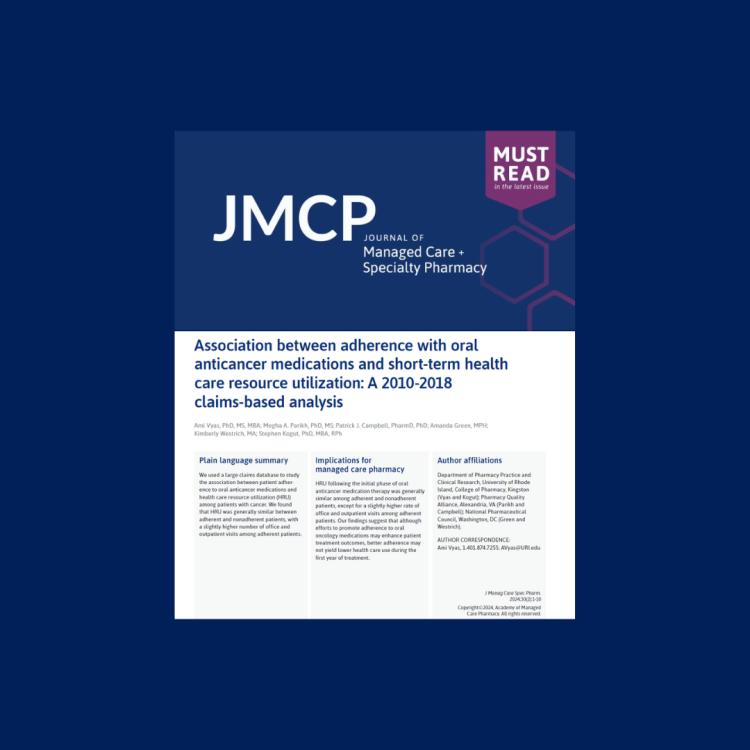AUTHORS
Ami Vyas, PhD, MS, MBA, Megha A. Parikh, PhD, MS, Patrick J. Campbell, PharmD, PhD, Amanda Green, MPH, Kimberly Westrich, MA, and Stephen Kogut, PhD, MBA, RPh
DESCRIPTION
In this study published as an open access article in the Journal of Managed Care and Specialty Pharmacy (JMCP), researchers used a large claims database to study the association between patient adherence to oral anticancer medications and health care resource utilization (HRU) among patients with cancer. They found that HRU was generally similar between adherent and nonadherent patients, with a slightly higher number of office and outpatient visits among adherent patients.
BACKGROUND
There is limited evidence on the effect of adherence to oral anticancer medications on health care resource utilization (HRU) among patients with cancer.
OBJECTIVE
To determine the association between adherence to oral anticancer medication and subsequent HRU.
METHODS
A retrospective cohort study was conducted using Optum Clinformatics® Data Mart commercial claims database. Patients who initiated an oral anticancer medication between 2010 and 2017 were included. The proportion of days covered was used to calculate medication adherence in the first 6 months after oral anticancer medication initiation. All-cause HRU in the following 6 months was assessed. Multivariable negative binomial regressions were used to determine the association between oral anticancer medication adherence and HRU, after controlling for confounders.
RESULTS
Of 37,938 patients, 51.9% were adherent to oral anticancer medications. Adherence with oral anticancer medication was significantly associated with more frequent physician office and outpatient visits for several cancer types with the strongest association among those with liver cancer (adjusted incidence rate ratio [aIRR] = 1.34; 95% CI = 1.18-1.52 and aIRR = 1.32; 95% CI = 1.13-1.55, respectively). Oral anticancer medication adherence was associated with more emergency department visits only among patients with lung cancer (aIRR = 1.22; 95% CI = 1.01-1.48). Oral anticancer medication adherence was significantly associated with a higher rate of inpatient hospitalizations and longer stays among patients with liver cancer (aIRRs were 1.45 [95% CI = 1.02-2.05] and 2.15 [95% CI = 1.21-3.81], respectively), whereas hospitalizations were fewer and length of stay was shorter among patients with colorectal cancer who were adherent with oral anticancer medication (aIRRs were 0.77 [95% CI = 0.68-0.86] and 0.77 [95% CI = -0.66 to 0.90], respectively). Other measures did not reveal statistically significant differences in HRU among adherent and nonadherent patients for the cancer types included in the study.
CONCLUSIONS
HRU following the initial phase of oral anticancer medication therapy was generally similar among adherent and nonadherent patients. We observed a slightly higher rate of office and outpatient visits among adherent patients, which may reflect ongoing monitoring among patients continuing oral anticancer medication. Further studies are needed to determine how oral anticancer medication adherence may affect HRU over a longer time period.

Read the full study now.
The study is available as an open access article in JMCP.